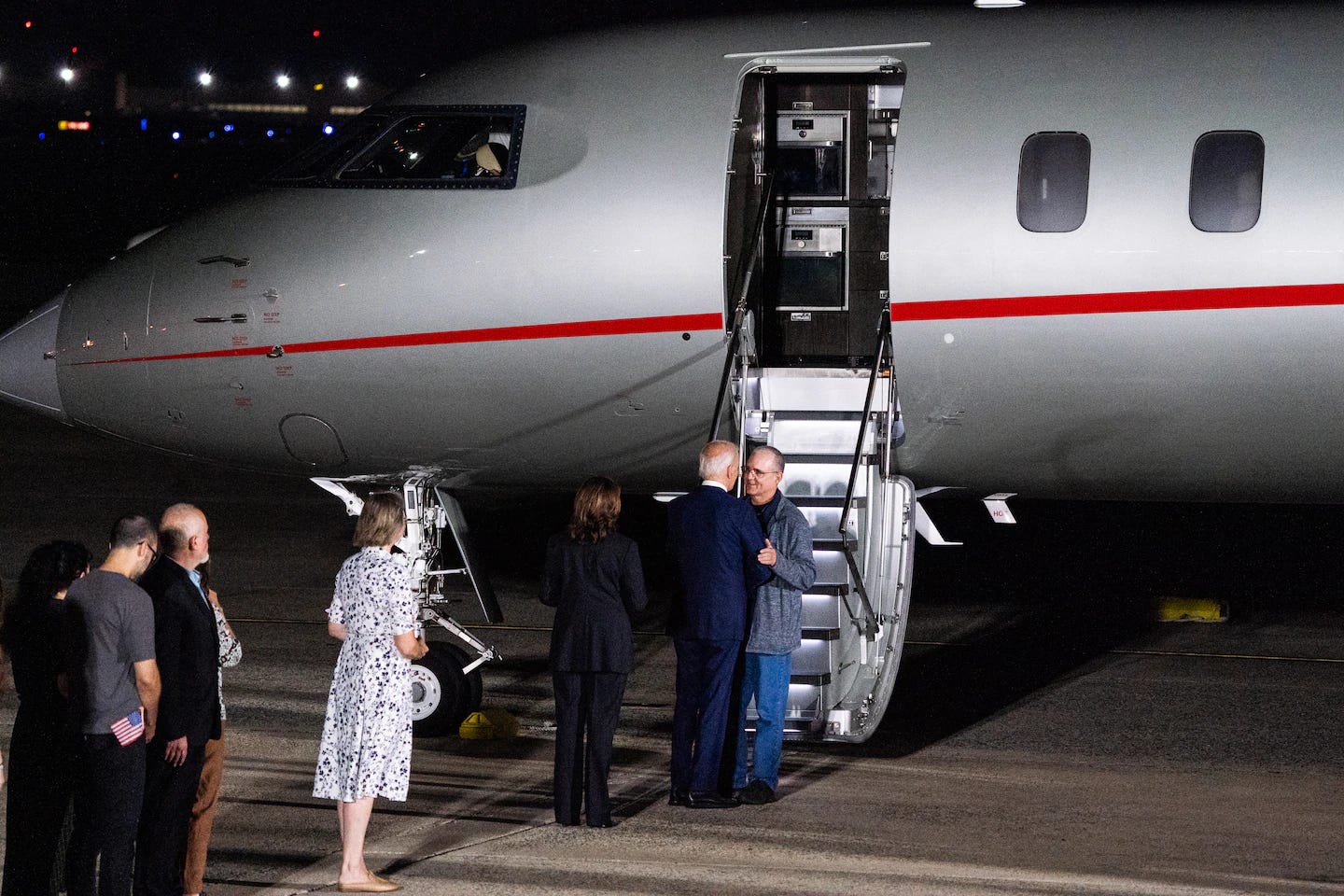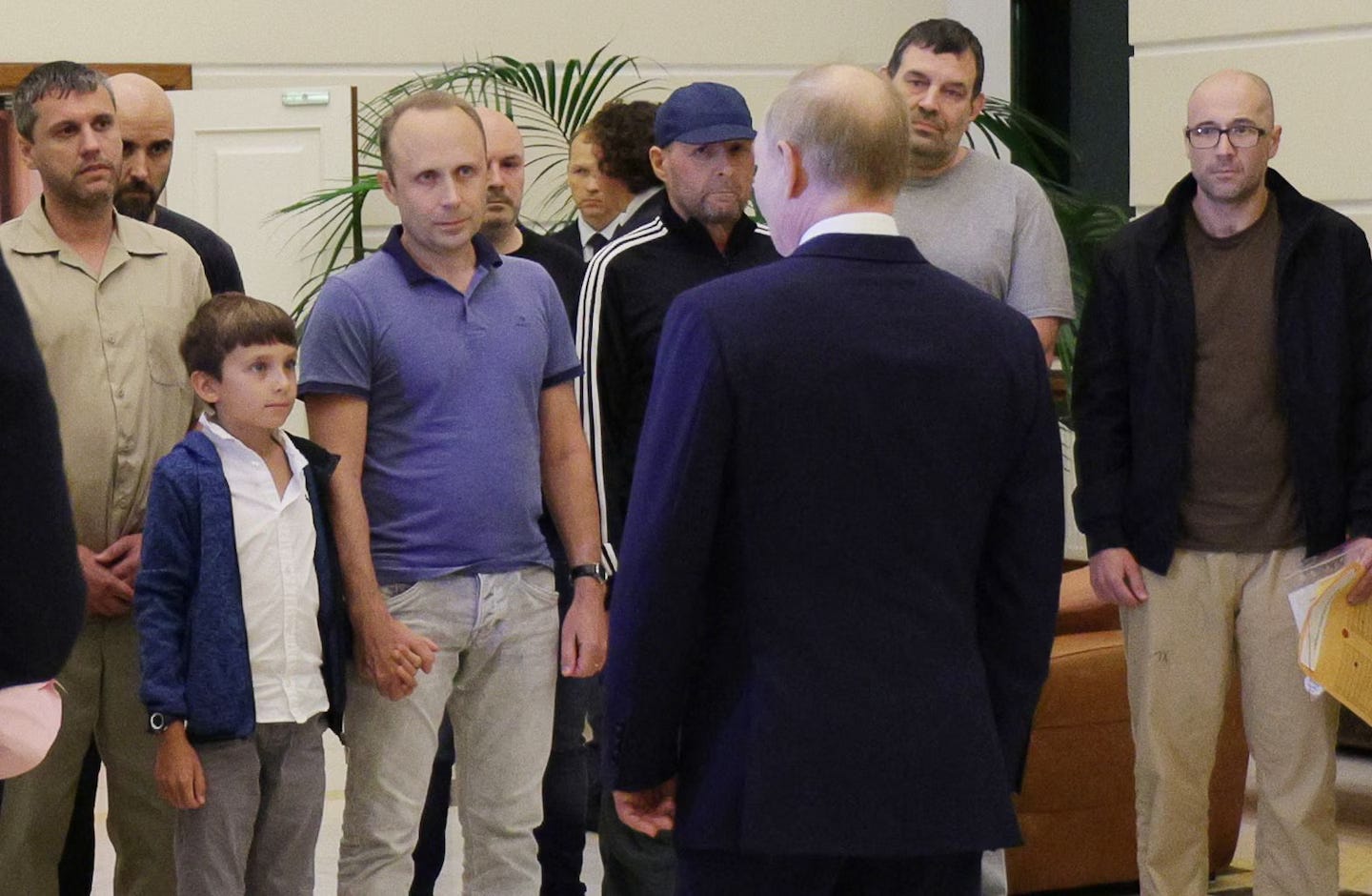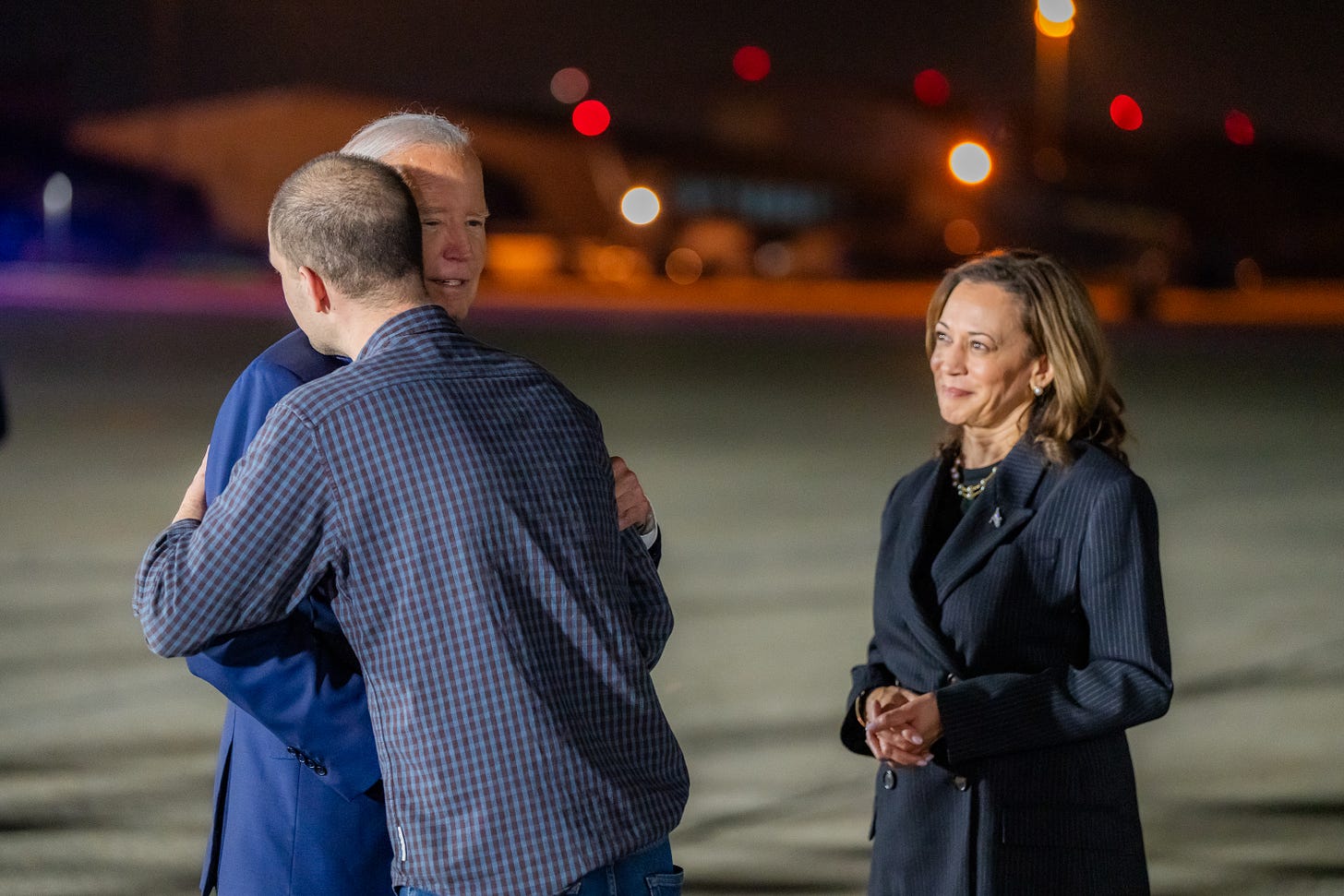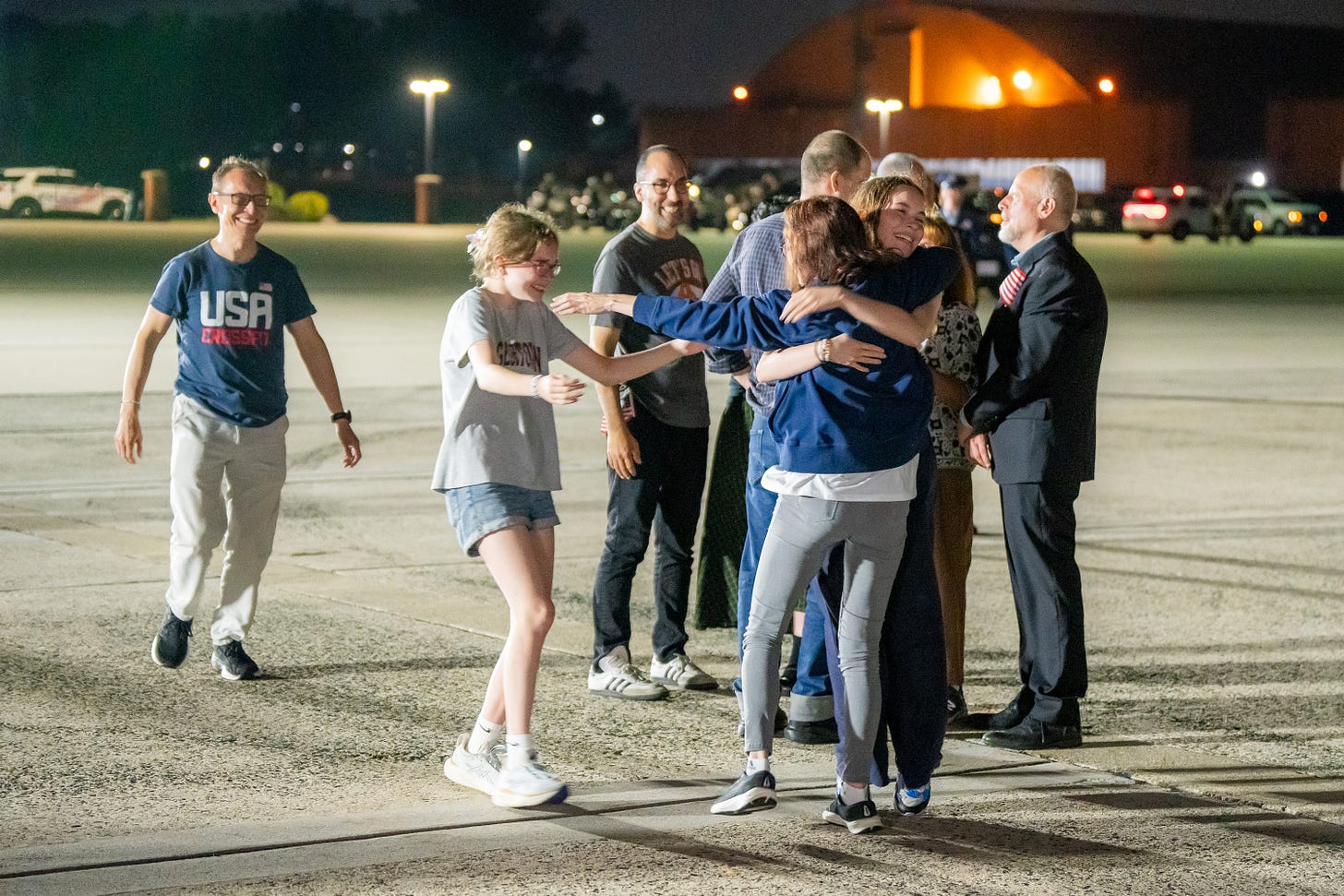Landmark U.S.-Russia Prisoner Swap: An In-Depth Analysis
A welcome sign of easing tensions between two superpowers, though it's premature to suggest a move towards détente.

U.S.-Russia Prisoner Swap
The recent U.S.-Russia prisoner exchange on August 1, 2024, marked a pivotal moment in diplomatic relations between the two superpowers. This significant event involved 24 individuals and showcased the complex international collaboration involving multiple countries. This piece provides a detailed overview of the exchange, the principal figures involved, and the broader implications for global diplomacy and human rights.
Overview of the Prisoner Swap
This largest prisoner exchange since the Cold War unfolded on a tarmac in Ankara, Turkey, symbolizing a coordinated effort involving not just the U.S. and Russia, but also Germany, Slovenia, Norway, and Poland.
Key Individuals Released
Significant figures released in the swap included:
Evan Gershkovich: A Wall Street Journal journalist detained since March 2023 on disputed espionage charges.
Paul Whelan: A former U.S. Marine held since 2018, similarly accused of espionage.
Alsu Kurmasheva: A journalist for Radio Free Europe/Radio Liberty, convicted on charges of spreading false information about the Russian military.
Vladimir Kara-Murza: A noted Kremlin critic, who post-release, opted to relocate to Germany.
The deal also facilitated the release of several Russians, including Vadim Krasikov, believed to be a Kremlin assassin, involved in a 2019 murder in Berlin, illustrating the ethical complexities inherent in such negotiations.
The Final Stages of Diplomacy: Securing a Historic Prisoner Exchange
As the Biden administration navigated the complex landscape of international diplomacy, optimism surged within the U.S. officials who believed they were on the brink of a significant breakthrough. For weeks, they had been engaged in intense negotiations to secure the release of more than a dozen individuals—including journalists, pro-democracy activists, and other Americans wrongfully detained by Russia.
Anxious Moments Before a Diplomatic Triumph
Despite the confidence that permeated the negotiations, the atmosphere remained tense with the realization that multiple factors could still derail the efforts. The involved parties included key figures such as Evan Gershkovich, a journalist accused under dubious charges, and Paul Whelan, a former Marine held for over five years on unfounded espionage allegations. The negotiations, which saw active participation from European allies and required meticulous coordination, were fraught with potential setbacks, including a scare when a plane briefly turned back on its route to Ankara, Turkey, where the exchange would culminate.
This phase of diplomacy was not just about liberating the detained but also about managing the intricate web of international relations and the political pressures at home, evidenced by President Biden's discussions with European leaders to ensure their continued cooperation. The relief that followed the successful transfer of the detainees highlighted the delicate balance of hope and caution that defined this monumental effort.
The Forgotten American: Marc Fogel's Ongoing Detention
In the shadows of a celebratory moment for some American families following the recent U.S.-Russia prisoner swap, the family of Marc Fogel, a 63-year-old American teacher, faced another bout of disappointment. While the exchange saw the release of prominent figures like journalist Evan Gershkovich and former Marine Paul Whelan, Fogel was notably absent from the list of those freed. Detained in Russia since August 2021 on charges of smuggling medical marijuana prescribed in the U.S. for back pain—a substance banned in Russia—Fogel's plight underscores a grim reality of international diplomacy.
Despite his significant service abroad, teaching in countries like Oman, Venezuela, and Malaysia, and his current role teaching English to prisoners while serving a 14-year sentence, his case has seemingly not been prioritized in high-stake negotiations. This oversight has drawn reactions from various U.S. lawmakers, emphasizing that his situation should not be forgotten and advocating for continued efforts to secure his release. The Biden administration has expressed a commitment to work towards freeing Fogel and other detained Americans, acknowledging the complex and often frustrating nature of international prisoner negotiations.
Alexei Navalny: A Legacy Beyond the Bars
Although Alexei Navalny, Russia's most prominent opposition leader, tragically passed away on February 16, 2024, his legacy continues to resonate deeply both within Russia and internationally. Navalny's untimely death in a remote Arctic Circle prison, where he was serving a 19-year sentence on charges widely regarded as politically motivated, has drawn global attention to the plight of political dissidents in Russia. Despite being a Russian citizen, his chances of release were slim, yet our thoughts turn to him and the harsh realities faced by thousands of political prisoners in Russia, who remain detained under questionable charges.
Navalny emerged as a formidable critic of corruption in Russia’s elite circles and was a vocal opponent of Vladimir Putin. His death has not only sparked international outrage but also highlighted the extreme risks faced by those who dare to challenge entrenched power structures in Russia. His struggle and the circumstances of his death serve as a stark reminder of the ongoing suppression of dissent in Russia, leaving a void in the opposition movement and raising poignant questions about the future of political freedom in the country. Navalny's life's work continues to inspire a new generation of activists and serves as a beacon for the fight against corruption and for democratic values.

Analyzing Putin's Narrative: A Western Critique
The recent prisoner swap between Russia and Western nations has highlighted divergent narratives, with Western perspectives accusing Russian President Vladimir Putin of manipulating public perception to serve his political agenda. Figures like Vladimir Kara-Murza, imprisoned for opposing Putin’s policies, exemplify what the West sees as political suppression under the guise of legal proceedings.
Western narratives argue that Putin’s portrayal of exchanged prisoners equates political dissidents with criminals, undermining the legitimacy of political opposition. This tactic is viewed as an attempt to solidify domestic support and disrupt international consensus on human rights. From a Western standpoint, equating dissent with espionage muddles the global dialogue on justice and rights, revealing a strategic reshaping of international discourse.
This perspective underscores the notion that one's understanding of justice and political integrity is heavily influenced by their geopolitical stance, illustrating the deep global divide in interpreting Putin’s actions. The critique suggests that Putin is not just defending national interests but is also engaging in a broader manipulative effort to control both domestic and international narratives around human rights and political freedom.
Diplomatic and Strategic Implications
The role of Turkey as a neutral ground for the swap was crucial, reflecting its strategic diplomatic position between the West and Russia. The involvement of European allies such as Germany, Slovenia, Norway, and Poland was instrumental, highlighting a collective Western effort to negotiate with Russia despite ongoing tensions, particularly regarding Ukraine.
The Aftermath and Ongoing Challenges
Following the swap, high-profile receptions in the U.S. celebrated the return of the Americans, emphasizing the success of international and diplomatic cooperation. However, the situation remains tense as other Americans, like Marc Fogel, continue to be detained in Russia under contentious circumstances, highlighting ongoing diplomatic challenges.
Looking Forward: Navigating Complex Diplomatic Waters
This prisoner exchange underscores the intricate and often morally complex landscape of international diplomacy. The event illustrates how diplomatic negotiations can lead to significant outcomes, including the return of detained nationals. However, the involvement of controversial figures like Krasikov in the swap also raises ethical questions about the compromises sometimes necessary in these high-stakes negotiations. Overall, the cooperation between multiple nations in this exchange demonstrates both the possibilities and the limitations of diplomatic efforts in resolving international disputes.





